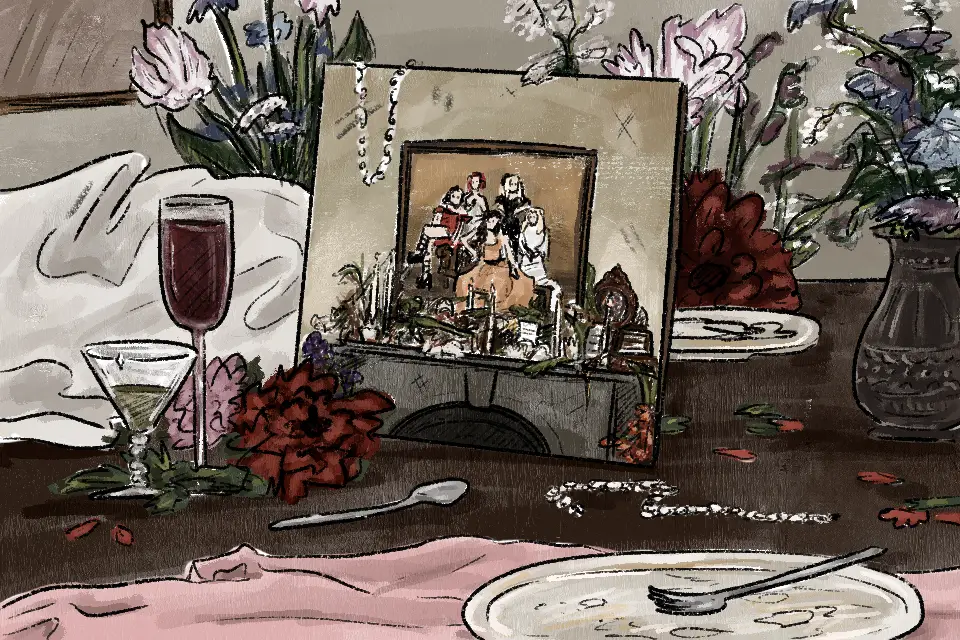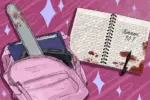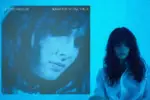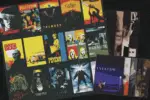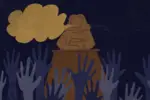Whether audiences have heard of them or not, the Last Dinner Party is skyrocketing to fame in the United States with a North American tour and slots at various American music festivals such as Hinterland and Lollapalooza. The band emphasized the importance of live performances, particularly in developing the band’s identity and music, before the release of its debut album “Prelude to Ecstasy” in February.
Composed of bassist Georgia Davies, guitarist and backup vocalist Lizzie Mayland, lead singer Abigail Morris, lead guitar Emily Roberts, and keyboardist Aurora Nischevi, the Last Dinner Party is a band that defies modern expectations. The band jumps around in what their music sounds like opposed to sticking with one genre as audiences might expect. While their clothing suggests something out of a Baroque painting, their hairstyles are unabashedly modern.
Their sound—which can range anywhere from gothic to modern rock—was developed through live shows at various British clubs venues, including the Mothclub, the Windmill, and XOYO. As opposed to defining themselves in terms of genre, bassist Davies said they use the words of opulent, decadent, or grotesque to describe their aesthetic.
Band members Davies and Morris came up with the band name when they imagined an elaborate dinner party with wine and blood. The band ended up keeping the name because, “it embodies an ethos of mystery, decadence, and maximalism.”
When looking at the cover art for “Prelude to Ecstasy”, these terms make sense. The cover shows the top of an ornate fireplace in front of an old-style portrait. The portrait has a sepia-beige background with color contrasts reminiscent of chiaroscuro, a Baroque art technique. Artists used chiaroscuro in paintings through strong contrasts of light and dark with the desired effect of creating dramatic volume and realism.
This allusion to the Baroque and Renaissance eras is continued through the bandmates’ dress where members wear long flowing dresses, corsets, and patterned tights. While the bandmates are dressed in varying levels of these medieval-inspired vintage clothing pieces, their historical garb is juxtaposed by the modernity of their hairstyles. The hairstyles range from choppy bangs, pixie cuts, and bleached hair with dark roots showing. Taking inspiration from “glam-rock and New Romantic” era musicians, the Last Dinner Party takes historical silhouettes and makes them modern.
The band’s aesthetic is on heavy display in their music videos, especially for the breakout single “Nothing Matters”, originally released in April 2023.
With fast cuts, the video flips between the members embodying gothic, decadent, and free-spirited attitudes within moments. Gothic, for these purposes, can be defined as gloomy or horrifying. There are scenes of the bandmates singing over a grave in the rain while dressed in black, a bathroom sink where blood is slowly dripping, and an unknown person jumping in the dark. These scenes are spliced between an elaborate dinner party with frilly dresses, red wine, and intricate table settings, constantly interrupting the viewer’s sense of reality.
Just when the audience thinks they know what to expect from the video, it changes; (much like the band’s aesthetic). Despite the established decadent focus in “Nothing Matters”, there’s a complete shift in the music video of “On Your Side.”. “On Your Side” employs techniques reminiscent of a home video with static and softer overlays. While there are no dramatic lighting contrasts, there is still the familiar naturalistic imagery found in other videos such as woods, bodies of water, and the band existing in nature. Although they may not be sticking to one aesthetic idea, it is clear the band is still themselves, just taking on a different vibe than before.
Putting aside visual aesthetics, The Last Dinner Party takes its audience through emotional journeys with juxtapositions of rock-sounding instrumentation, lyrics with historical influences such as Ancient Greece and Caesarian Rome, and titles reminiscent of social media trends.
Take the track “The Feminine Urge” for example. “The Feminine Urge” sounds like something from social media at first glance, given the popular meme of 2021. Yet, it includes lyrics such as “I am a dark red liver stretched out on the rocks” and “How I wish the trees would swallow me, make me a forest.” The “dark red liver stretched out on the rocks” brings to mind the fate of Prometheus, chained to a rock, whose liver was eaten by an eagle every day. The forest lyric possibly draws from the Greek myth of Apollo and Nymph Daphne, who in her effort to avoid Apollo’s pursuit, begged her river god father — speculated to be Ladon — to save her, resulting in her becoming a tree.
The chorus of the song finds the singer labeling the feminine urge as one “to nurture the wounds my mother held.” While the social media meme featured urges to not smile in pictures or reread messages when you miss someone, the feminine urge in the song refers to the relationship of the singer with their mother. The singer is caught between what she knows of femininity through her relationship with her mom and what it would mean to extend it to another generation: “I could never give the curse to her. I could never live with the guilt of lying.”
For the song “Ghuja”, keyboardist Nischevi takes the mic. It’s distinct instrumentally, with a heavy focus on the keyboard while, vocally, the band creates a sound reminiscent of a church with hauntingly sweet harmonies. It’s one of the shorter songs on the album and is sung exclusively in Albanian. Given the language shift, the words demand more from the audience’s listening ability because while the language changes from the rest of the album, the emotion in the band’s voice can be universally understood. If anything, the audience can emphasize more so with the meaning of the song because it’s likely that they too have never learned Albanian. The song, who’s title, “Ghuja”, means “language” , reflects on Nischevi’s shame of not knowing Albanian better since it is her mother tongue. The lyrics “E hupa gjuhën, Kurrë se mësova” translate to “I lost my tongue, I never learned”.
Given the band’s emphasis on live performing for their process, there’s no telling when the next album is next. Given the aesthetic richness and lyrical complexity found in “Prelude to Ecstasy,” there’s enough to unpack and enjoy until The Last Dinner Party releases whatever comes next.


